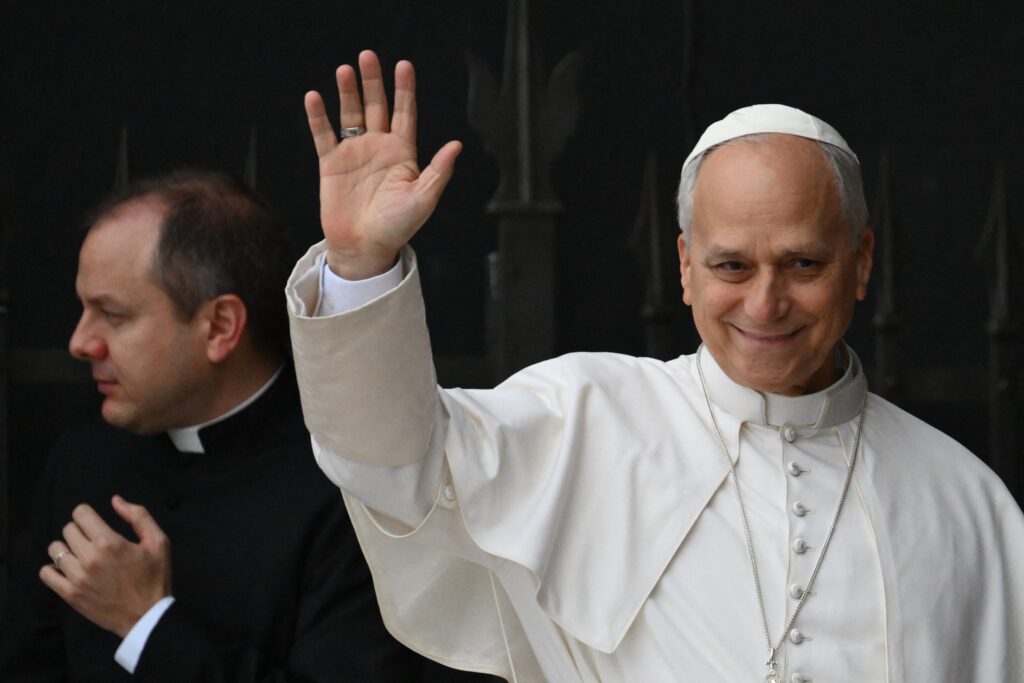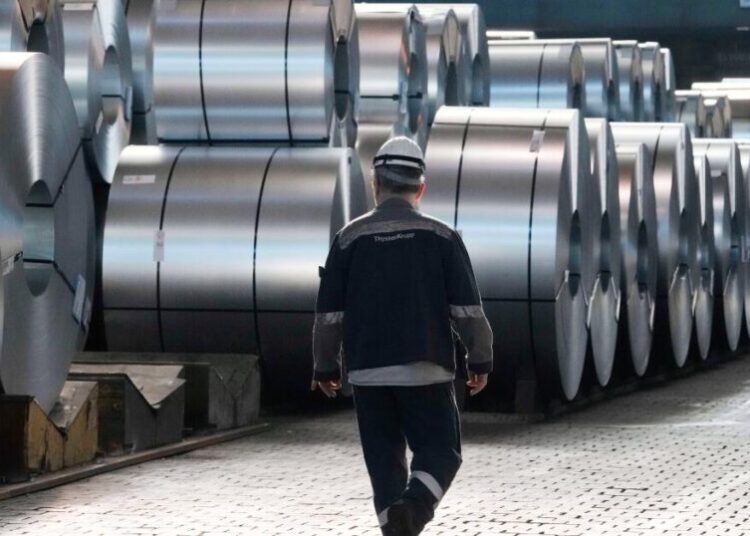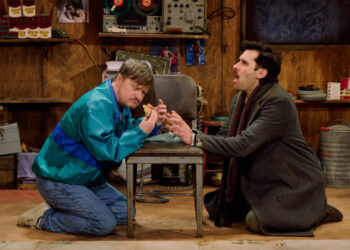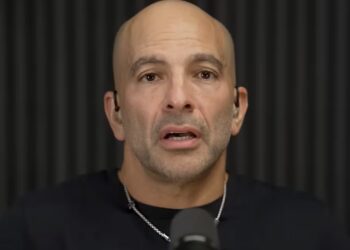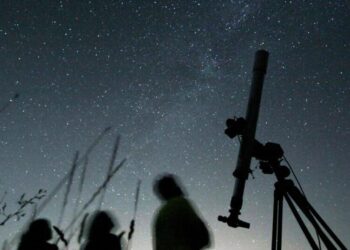VATICAN CITY — Pope Leo XIV met Friday with a delegation including Ukrainian officials, victims of Russia’s war and a U.S. senator as the Kyiv government sought to tap the new pontiff’s calls for peace to coax the Vatican into a larger role in efforts to release prisoners, civilians and children held by Russia.
Ukraine first sought Vatican intervention shortly after Russia’s full-scale invasion in 2022, with diplomats from the Holy See opening informal channels in Kyiv and Moscow to receive and share lists of missing people presumed to be in Russian hands. The Ukrainians now are looking to “formalize” that effort and establish guidelines for information exchanges and releases, using the Vatican as an interlocutor, according to Iryna Vereshchuk, deputy head of President Volodymyr Zelensky’s office.
A letter from Zelensky stating as much was dispatched before the delegation’s arrival, she said.
“We are asking the Holy See to perform a very important mission by becoming a platform where we can establish communication with the other side, with our enemy, so that we can talk about the return of our children, the return of civilians and the return of prisoners of war that are kept in Russian facilities,” Vereshchuk said.
The Vatican visit came as the Trump administration is seeking to pressure Kyiv into a ceasefire plan heavily favoring Russia. The push for cooperation with the Holy See now is different from efforts earlier this year by President Donald Trump and Italian Prime Minister Giorgia Meloni to use the Vatican as a forum for peace talks to end the war. That notion was nixed by the Russians in May.
In an interview published in September, Pope Leo additionally said that it was not “realistic” for the Vatican to act as a mediator.
“I’d make a distinction in terms of the voice of the Holy See in advocating for peace and a role as mediator, which I think is very different and is not as realistic as the first one,” Leo told American journalist Elise Ann Allen.
But the Vatican is seeking to aid in the release of detainees and missing children.
The current effort, according to a diplomatic official familiar with the talks who was not authorized to speak to the press, also centers increasingly on the release or exchange of adult civilians.
Earlier this month, an official list with about 250 names of civilians was given to the Vatican by Ukraine and passed on the Russians. An additional list of a few hundred missing children was provided “several weeks ago” the official said, but the Russians have requested more information, such as who in Ukraine is seeking to locate them.
The Vatican is considering ways to escalate its involvement, including the possibility of engaging the Russians more robustly. Both sides have expressed confidence in Cardinal Matteo Zuppi, the Vatican’s emissary to Ukraine, as a trustworthy interlocutor. The Vatican, along with Qatar and the United States, has helped secure the return of some children, though how many remains unclear.
“Obviously, on humanitarian issues, the Holy See is, quite simply, very open” to helping, said the Rev. Visvaldas Kulbokas, the Apostolic Nuncio — or Vatican ambassador — to Kyiv. “That’s why this visit is taking place now … [but] technical issues will need to be looked into. In principle, there’s been a great deal of demand [for help on this] from Ukraine, and a great deal of willingness from the Holy See.”
During Friday’s meeting, Leo met Ukrainian officials, as well as several parents and children who endured hardships as a result of the Russia’s war. Also participating was U.S. Sen. Amy Klobuchar (D-Minnesota), who has championed the cause of the Ukrainian children.
Leo heard the personal stories of survivors, who described the trauma of separation, the conditions of their captivity and the emotional toll of their ordeals.
In an interview with The Washington Post, Klobuchar said she had requested to join the delegation to appeal to the pope following a bipartisan call between several senators and Zelensky. She described Leo as empathetic in the meeting to the plight of Ukrainian children.
The Vatican is “this moral voice and pure force in terms of really trying to get the Russians to the table with the Ukrainians,” Klobuchar said. “It’s mostly in this case, on the humanitarian side, it’s [about] what the Russians need to do. … I just would hope that as all of these peace negotiations are going on, that they can play a role, maybe even beyond the kids, with the prisoners of war and also the civilian prisoners.”
Ukraine wants a full accounting of children from occupied areas that have been held in Russian custody, as well as their repatriation, to be included in any peace deal.
The Conflict Observatory — part of Yale University’s Humanitarian Research Lab — has verified the identities of at least 19,500 of these children, some of whom have been sent to reeducation camps or adopted into Russian families. The real number is probably much higher, senior Ukrainian officials say, but cannot be confirmed without Russia’s help.
In early November, Ukraine said that it had identified about 400 sites in Russia where children are held after being taken from their parents at filtration checkpoints or moved from boarding schools, orphanages or other care facilities. Finding them, Zelensky said, is “very complex work,” adding that only about 1,600 children been returned in the nearly four years of the full-scale invasion.
The Kremlin claims it moves children deeper into Russia to “save” them from combat — but their illegal transfer spurred war crimes charges in 2023 against President Vladimir Putin and his deputy, Children’s Rights Commissioner Maria Lvova-Belova, by the International Criminal Court in The Hague.
Another 1.6 million Ukrainian children remain in territories controlled by Russia, said Mykola Kuleba, former children’s ombudsman for Ukraine and head of the nonprofit Save Ukraine, which helps people escape occupation.
“Knowing what we know, Putin will never voluntarily agree to return the children,” Kuleba said. “So we continue rescuing children ourselves, extracting them one by one from the most dangerous situations.”
He said he was hopeful that the pope could have an effect because “his voice matters.”
The Vatican has long been used as a mediator in diplomatic talks, particularly in Latin America. Neither Ukraine or Russia are majority Catholic countries, but the Vatican has been viewed by both sides as an impartial player without strategic interest.
Deeper involvement by the Vatican would mesh with one of the major themes of Leo’s early papacy — peace.
Leo has been fervent in his support of Ukraine. While working as a bishop in Peru in 2022, Leo bluntly criticized Russian aggression, describing the war in a video as an “imperial invasion.” He has frequently mentioned the country in his public prayers. In May, a phone call with Zelensky was his first with a world leader after becoming pope.
“I carry in my heart the sufferings of the beloved Ukrainian people,” Leo said during his first Sunday blessing in St. Peter’s Square. “May everything possible be done to reach an authentic, just and lasting peace, as soon as possible. Let all the prisoners be freed and the children return to their own families.”
The Vatican traditionally remains neutral in global conflicts, and the Ukrainians sometimes had mixed sentiments about the response of Pope Francis, Leo’s predecessor.
Francis denounced the war. But he also expressed understanding of Moscow’s position, stating that the “barking of NATO at the door of Russia” might have provoked the invasion. In August 2023, the Vatican did damage control after Francis appeared to glorify Russia’s imperial past.
Among those who met Leo on Friday was Veronika Vlasova, 16, who said she was taken into Russia after its forces occupied the eastern Ukrainian village where she was staying in 2022.
She said she was bused into Russia and housed in different facilities for 14 months, with four people to a room. She was forced to speak Russian, write letters of support to Russian soldiers and repeatedly told that Ukraine no longer “existed.” After she managed to make a call to her mother in Ukraine, her family secured her release with the aid of the Red Cross.
Ahead of her meeting with Leo, she said her intention was to tell “him and the whole world … what Russia is doing to Ukrainian children and to make them help us save thousands of other kids who still remain in Russia.”
The post Ukraine delegation meets Pope Leo to discuss children held in Russia appeared first on Washington Post.
